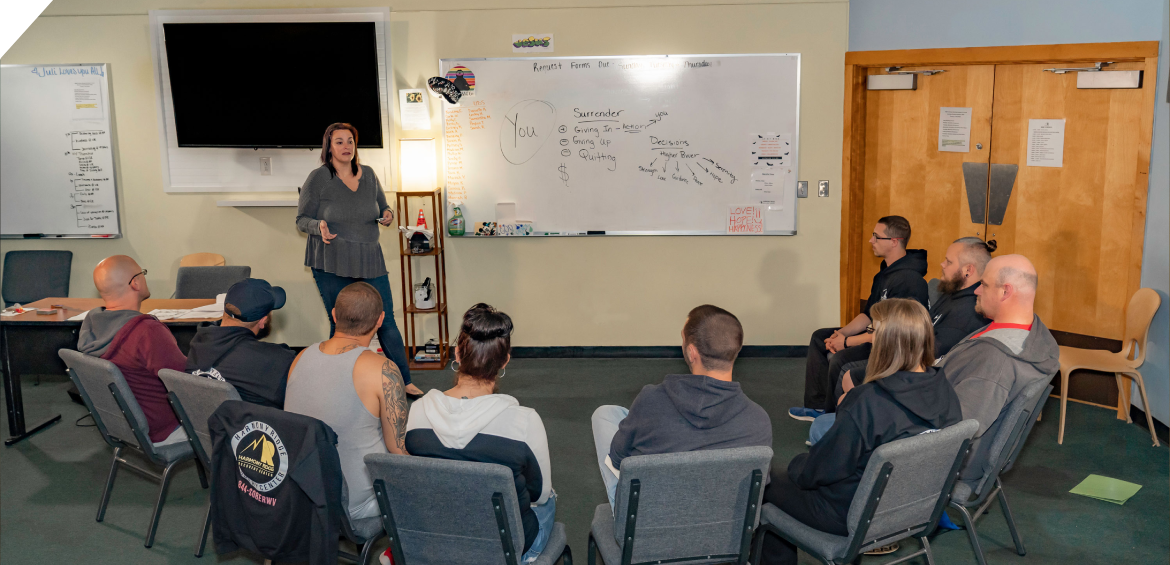Addiction Therapy
Discover a wealth of information on various therapy options for addiction treatment available at Harmony Ridge. Let the journey toward healing and recovery begin!
Addiction is a complex disease that can affect a multitude of areas in an individual‘s life. In 2017, studies showed that about 20 million U.S. citizens needed therapy for addiction to substances; however, less than 3 million had received any specialized substance addiction therapy.

Substance addiction requires individualized treatment modalities that address the underlying causes and symptoms of the disease along with its consequences. This is because abusing substances often negatively affects people’s lives. For example, abusing substances may impact a person’s mental and physical health. It may also impact a person’s ability to do well in school or work, ability to function at home, and ability to socialize. Luckily, there are multiple types of addiction therapies available to help users get the treatments that they need.
Addiction therapy is a structured and evidence-based component of addiction treatment that focuses on helping individuals overcome addiction and manage co-occurring mental health disorders. It includes various forms of psychological counseling and behavioral interventions, such as Cognitive Behavioral Therapy (CBT), Dialectical Behavior Therapy (DBT), group therapy, and individual counseling. These approaches aim to equip individuals with the tools to reduce or eliminate substance use, address underlying psychological challenges, and improve overall well-being. While addiction therapy plays a crucial role, it is just one part of a comprehensive addiction treatment plan, which may also include medical care, medication-assisted treatment, and support services.
The very root of what Harmony Ridge Recovery Center WV programs are about can be seen in our addiction therapy treatment center programs. Our team believes in providing evidence-based, clinically effective therapies. Such therapies have been scientifically proven to help individuals make it through the recovery process.
Listed below are some of the more common forms of therapy for addiction.
What is Addiction Therapy Treatment?
For a majority of addicts, the first step towards recovery is to acknowledge that the addiction disease is present. The next step will be to find a treatment program that can help restore overall health, happiness, and well-being. Once treatment is completed, it’s highly recommended to continue reinforcing the lessons that were learned in rehab programs by attending addiction therapy sessions and support groups.
Addiction therapy methods used in substance addiction treatment will be based on the patient’s health and substance use patterns. Some therapy options will include an array of group or individual therapy sessions, which will be typically organized by addiction therapy counselors.
Most will agree that behavioral therapies are an essential therapy option in treating substance abuse.
Still, with so many options, it’s tough to determine which forms of addiction treatment are available, how they differ, and which is best for a particular situation. Studies have shown that there isn’t any singular approach to therapy for addiction that is appropriate for every person. Therefore, it is essential to learn about the different forms and styles of therapy when attempting to find the best program for yourself or a loved one.
Forms of Addiction Therapy and Treatment
Addiction treatment therapy options are based on an individual’s substance abuse patterns and health. Options for addiction therapy will include a variety of group or individual therapy sessions, which are typically organized by addiction specialist counselors.
Individual Therapy
The most common form of therapy, individual therapy, involves only the patient and a therapist. Through each session, the therapist will help guide the patient in a manner that can address the underlying psychological aspects of his or her addiction, making addiction recovery possible.
Group Therapy
Group therapy is built to help each member involved by learning from each other, sharing experiences, and addressing common issues related to substance addiction. Through group therapy, individuals can begin opening up, bonding, and healing in ways they weren’t able to before. Group therapy sessions are conducted by addiction treatment providers who structure the group settings and topics.
Family Therapy
Family therapy is a mix of personalized counseling sessions built for children, siblings, spouses, parents, or family members. Sessions cover topics like communication techniques, self-care techniques, and family history. The mission of family therapy is to address the interconnected nature of family kinship.

A trained mental health professional will conduct the sessions and help family members identify areas needing improvement by educating members on cultivating more supportive relationships. By intervening in these intricate relational models, therapists help to nourish healing transformation throughout the whole family.
Cognitive Behavioral Therapy
Cognitive behavioral therapy (CBT) helps patients in addiction recovery uncover problematic feelings or thoughts that could jeopardize their sobriety and cause a relapse. CBT is taught in the idea that negative thought patterns can lead to undesired emotions and actions, and problematic behaviors can lead to undesired emotions and contradictory thoughts. This interconnection between behaviors, feelings, and thoughts is the core of CBT.
During a CBT session, the therapist will learn a patient’s negative feelings and thoughts that led to substance use, as well as the feelings and thoughts he or she had after using. The treatment provider will then look for cognitive distortions that assist in feeding these behaviors.
CBT is known throughout the addiction treatment community as the best form of therapy used for recovering addicts and alcoholics. CBT can also be useful in treating co-occurring mental health conditions, such as bipolar disorder, depression, anxiety, eating disorders, and even marital issues.
Dialectical Behavior Therapy
Dialectical behavior therapy (DBT) is a style of therapy influenced by CBT. During DBT, severe mental illnesses such as obsessive-compulsive disorder (OCD) are treated together with substance use disorders. DBT therapists strive to help patients gain self-esteem, learn stress-management skills, and encourage patients to remove addiction triggers from their lives.
Since Its Origins, Analysis Has Found DBT Beneficial for Other Mental Health Issues Which Include:
- Substance use disorder
- Post-traumatic stress disorder
- Anxiety disorder
- Eating disorder
- Mood disorder
Dialectical behavior therapy assumes that mental health counseling issues act from a mixture of invalidating environments and emotional vulnerability. Patients practicing DBT will receive a balance of acceptance and support to start living a healthier and happier lifestyle.
Motivational Enhancement Therapy
Motivational enhancement therapy (MET) is a form of therapy developed to help patients in addiction recovery discover how to substitute any negative thoughts and actions connected to their addictions with positive ones. MET is commonly used to treat patients in substance abuse recovery who suffer from co-occurring conditions, like post-traumatic stress disorder (PTSD) and bipolar disorder, along with substance addiction.
Psychodynamic Therapy
Psychodynamic therapy helps patients examine their emotions to reveal how their subconscious feelings link to their addictions. This helps in identifying the underlying causes of addiction. Patients who work with therapists to recognize their own negative emotions will be better prepared to identify and avoid temptations during their recovery.
Trauma Recovery
Numerous individuals who are struggling with alcohol and drug addiction also have a history of trauma. Trauma can be from any particular assortment of experiences like a natural disaster, terrorism, combat, or even separation or divorce. Therapy for addiction will provide various evidence-based treatments to help patients work through their trauma. These will also help patients rebuild their psychological well-being.

How Does Therapy Help in the Treatment of Addiction?
Therapy helps in the treatment of addiction in a variety of different ways for many different people. Family therapy, group therapy, cognitive-behavioral therapy, rational emotive behavior therapy, individual therapy, and other types of therapy have the ability to help an individual stay sober. Therapy for addiction and psychotherapy can also treat a variety of mental health problems.
A substance use disorder is more than just physical dependence on drugs and alcohol. Even after an individual completes detox, when his or her body is no longer dependent on substances, it’s more likely to struggle with issues that cause that person to relapse.
Certain social and psychological factors can act as powerful addiction triggers that lead to relapse. Some of these social and psychological factors include the following:
- Social networks, such as spending time with friends who continue to engage in substance abuse or drug abuse.
- Cues in the environment, such as visiting a neighborhood.
- Stress, especially sudden life stresses.
The above-mentioned triggers have the ability to create a powerful, continuous urge to abuse substances again.
Behavioral therapies help individuals escape their cravings and better learn how to manage whatever life might throw at them without having to abuse drugs. There are several behavioral therapies that are able to help treat substance use disorders.
There isn’t one method that is known to be better than another when it comes to addiction therapy and treatment. Likewise, there isn’t one addiction therapy and treatment approach that works for everyone who has a drug or alcohol addiction. The plan of a correct type of addiction therapy and treatment will be specifically tailored to the person’s individual and addiction needs.
Contact Harmony Ridge Today!
The first step toward achieving recovery is to reach out to one of the rehabs in WV that can get you on the track to recovery. Our admissions team is available 24 hours a day, 7 days a week, 365 days a year. Give us a call today!
Contact Us TodayWhat Kind of Therapy for Addiction is Best?
When approaching addiction as a whole, there isn’t a one-size-fits-all approach, so there isn’t one kind of therapy for addiction that is best for each person. For example, the substance abuse treatment programs might vary based on the specific individual’s needs.
It is best to determine between addiction treatment options based on the following factors:
- What health care options you can be afforded
- Your personal mental health counseling needs
- The level of care that you need
- Any non-substance that you are abusing
The following are the most common addiction treatment options that have set many patients on a successful road to recovery.
Detox
The medically assisted detox program allows the individual to completely rid his or her body of addictive substances that create addictive behaviors in a comfortable and safe environment. This is extremely beneficial because sometimes substance use disorder withdrawal symptoms can cause life-threatening and uncomfortable physical symptoms. Due to the fact that detox doesn’t treat the underlying behavioral causes of drug addiction, it’s generally used in combination with other behavioral therapies.
Cognitive Behavioral Therapy
According to American Addiction Centers, cognitive behavioral therapy, also known as CBT, is an extremely valuable tool that is able to be used for various types of drug addiction treatments, including, but definitely not limited to:
- Prescription drug addiction
- Alcohol addiction
- Drug addiction
Not only is CBT able to assist individuals in recognizing their unhealthy behavioral patterns, but it can also help with helping them learn to develop healthy coping skills and identify addiction triggers. CBT is able to be combined with other therapeutic techniques as well.
Rational Emotive Behavior Therapy
Rational emotive behavior therapy, also known as REBT, could help an individual recognize negative thoughts or self-destructive behaviors and give ways to actually combat self-defeat feelings. The main goal of REBT is to help the person realize that there is power that lies in rational thinking and it’s within themselves. It is not related to external stressors or situations.
Contingency Management
Contingency management, also known as CM, is utilized to treat addiction and a huge variety of treatment options including narcotics, tobacco, and alcohol. This therapy for addiction reinforces positive behaviors such as maintaining sobriety by giving tangible rewards. According to the National Institute on Drug Abuse, this type of substance abuse treament option can successfully help an individual combat relapse.
12-Step Facilitation
12-step facilitation therapy, also known as 12-step programs, can be utilized to treat substance abuse and alcohol use disorders. It is a form of group therapy that includes the recognition that addiction treatment programs have many negative consequences that are able to be emotional, social, physical, or spiritual. This therapy begins with acceptance, and then gradually moves to surrender to a higher power, then eventually transitions to consistent group meeting involvement. Programs such as Alcoholics Anonymous utilize group meetings for mutual support and discussions.
Treatment With Medication
Medication has the potential to play a very important role in addiction recovery when combined with behavioral therapies. There are certain medications that are able to improve overall mood, decrease addictive behaviors, and reduce cravings. The therapeutic interventions can be used to assist individuals in developing strong overall life skills.
Alternative Forms of Addiction Treatment Therapy
Wellness Education
Addicts often ignore their psychological and physical well-being when actively abusing substances. Harmony Ridge Recovery Center WV addiction therapy treatment programs provide wellness coaching on keeping physically fit. They’ll also provide lessons on how to incorporate healthy choices back into their lifestyles.
Each individual therapy has proven to be useful for people recovering from addiction and substance abuse. Our patients at Harmony Ridge will learn how to incorporate these therapies into their treatment center plans to address the many different requirements they may have.
Holistic Therapy
Practicing holistic therapy helps patients concentrate on their overall well-being while additionally treating their substance withdrawal physical symptoms. Holistic therapies may include acupuncture, yoga, guided meditation, and art therapy.

Experiential Therapy
Experiential therapy employs unorthodox treatment techniques to aid recovering addicts in defeating repressed feelings and emotions that might have contributed to their addiction. General forms of this therapy include outdoor recreational activities like mountain biking, rock climbing, and hiking.
Music And Art Therapy
Music and art have long been perceived as beneficial for the human population, as engaging in these can be especially fulfilling. By composing music and producing art, patients can focus on their spiritual recoveries by discovering their inner strength.
Education Workshops
Although patients have experienced addiction, there is still much to learn about how it affects the body and brain. Through teaching workshops at Harmony Ridge, patients can learn about how the brain changes while substances are abused and what classifies addiction as a disease.
Biofeedback Therapy
Biofeedback is a method of therapy that aids recovering patients in learning their bodies’ involuntary processes. During a biofeedback session, a therapist will use electronic sensors on the patient’s skin to observe his or her brain activity.
Following studying the brain wave patterns, the therapist can suggest a variety of psychological methods that can support defeating addictions. Biofeedback therapy is often efficient for individuals with anxiety disorders and substance abuse difficulties.
Adventure Therapy
Engaging in physical activity like walking, horseback riding, or kayaking can help patients relax and express their most profound emotions. Adventure therapy also helps patients develop trust, connections, and friendships through hands-on activities that can be applied to recovery. Adventure therapy encourages patients to recover simply by doing.
Receive Addiction Therapy and Addiction Lawyer
If you or a loved one has a substance addiction, our team at Harmony Ridge can help. Contact us today with any questions regarding our addiction therapy programs, such as inpatient rehab or outpatient rehab. Our team of specialists will provide you with information to make a significant life-changing decision. Our mission is to ensure that all patients enrolled here can get the addiction therapy treatment they need and deserve. This could mean attending outpatient treatment programs or inpatient treatment programs.
With the right amount of dedication and determination, recovery is possible. This will help carry patients through several various addiction therapy programs. This will, in turn, allow individuals to learn new tools that they can apply to real life. When the time finally comes to transition to the real world, these skills will help such individuals maintain a healthy, happy lifestyle that’s free from addiction. Do not wait any longer to get the help you need. Contact our specialists at Harmony Ridge Recovery Center WV today!
Jump To Section
Begin Your Journey to Healing Here
Ask me about recovery, I can help you!
Our recovery specialists are standing by 24/7 to help you or your loved one.
Or call us: 


